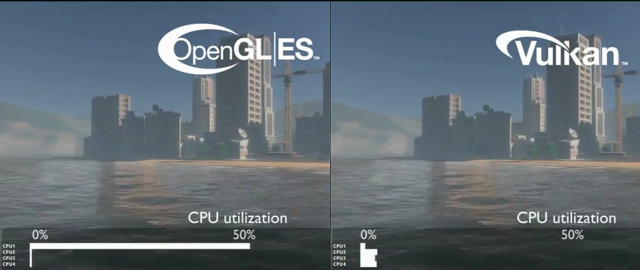Vulkan was introduced as the successor of OpenGL ES in March 2015, promising to take less CPU resources, and support multiple command buffers that can be created in parallel and distributed over several cores, at the cost of slightly more complex application programming since less software work in done inside the GPU drivers themselves with app developers needing to handle memory allocation and thread management.
 This was just a standard at the time, so it still needed some time to implement Vulkan, and work is still in program but ARM showcased the power efficiency of Vulkan over OpenGL ES in the video embedded at the end of this post.
This was just a standard at the time, so it still needed some time to implement Vulkan, and work is still in program but ARM showcased the power efficiency of Vulkan over OpenGL ES in the video embedded at the end of this post.
The demo has the same graphics details and performance using both OpenGL ES and Vulkan, but since the load on the CPU in that demo can be distributed over several CPU cores with Vulkan against a single core for OpenGL ES, it’s possible to use low power cores (e.g. Cortex A53) operating at a lower frequency and voltage, hence reducing power consumption.
ARM also measured that the complete OpenGL ES demo would use 1270 joules against 1123 Joules for the Vulkan demo, resulting in about 15% energy savings in this “early stage” demo.

Jean-Luc started CNX Software in 2010 as a part-time endeavor, before quitting his job as a software engineering manager, and starting to write daily news, and reviews full time later in 2011.
Support CNX Software! Donate via cryptocurrencies, become a Patron on Patreon, or purchase goods on Amazon or Aliexpress





That’s a surprise. I would have thought the extra context switching would have evened out the performance gains in term of power… But to actually come out ahead and end up saving power is quite an achievement.
I guess, once again, we end up with simpler = better.